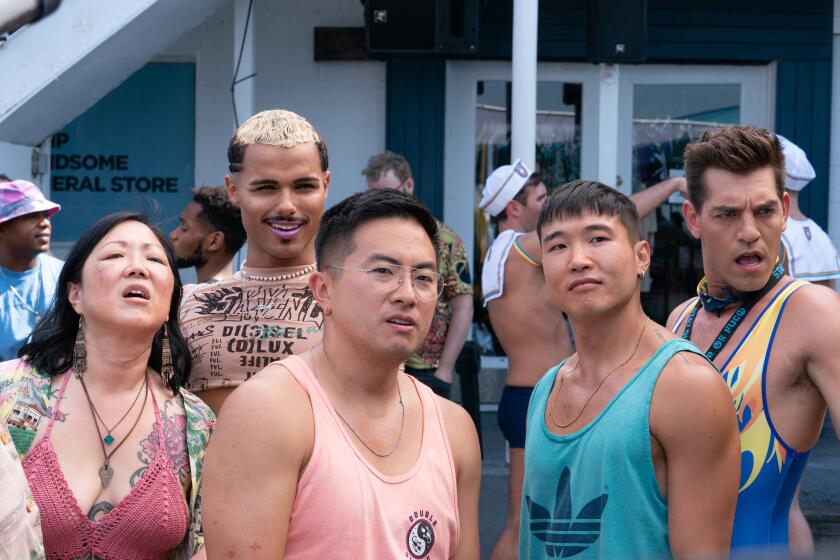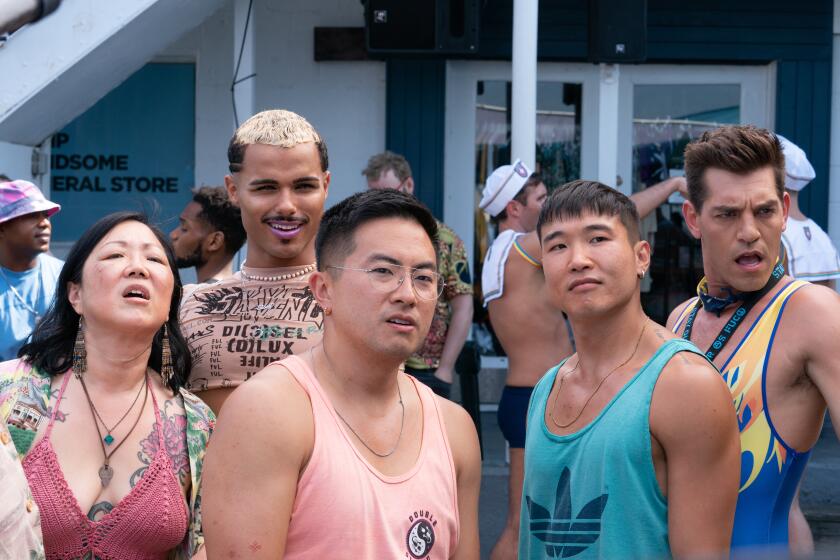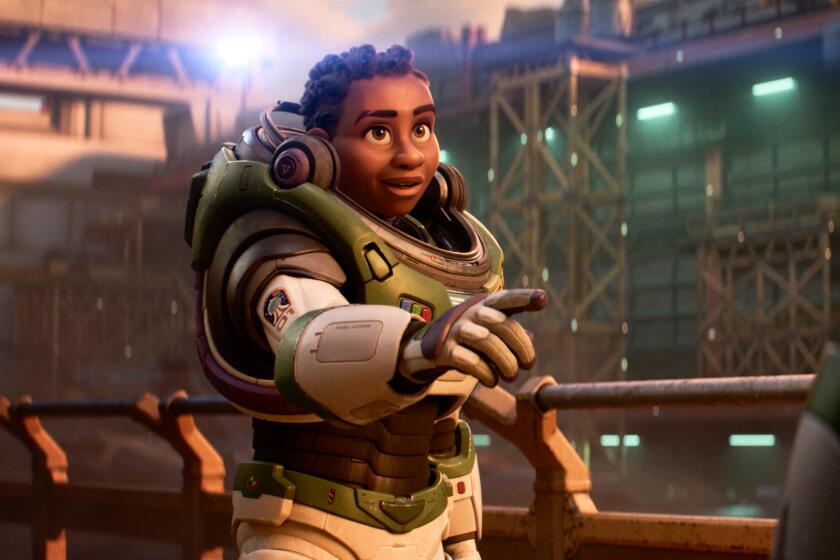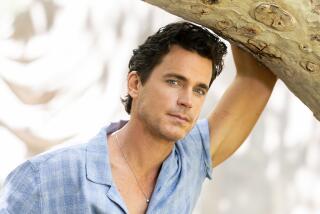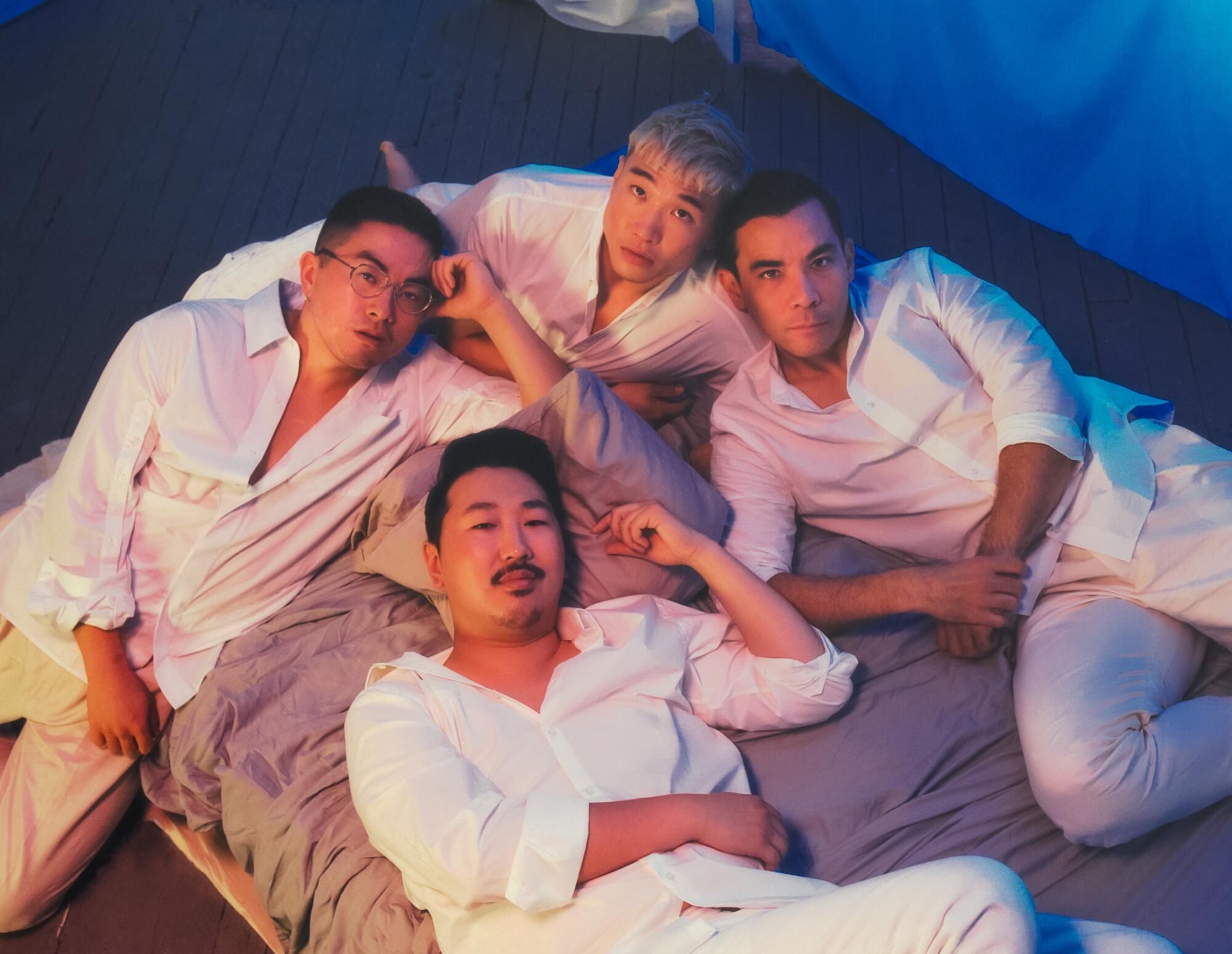
Joel Kim Booster and Bowen Yang remember that first trip, years ago, to the beachy New York LGBTQ resort that would inspire the Hulu rom-com, “Fire Island.” Before playing BFFs Noah (Booster) and Howie (Yang) in the film, who find unexpected romances while vacationing at the Long Island party destination, the real-life friends were on a similar getaway, staying 12 deep in a three-bedroom house, “really making it work despite our comedians’ salaries,” said Yang.
“There is a magical energy, an ephemeral thing about it,” Yang said from New York City ahead of the film’s early June release. “You get on the ferry and it’s like a portal into another dimension.” Connected by wooden boardwalks and accessible only by water, idyllic Fire Island offers a place of unique liberation, and one not just free of cars.
“I’ve never felt closer to my friends than when we’re on Fire Island together experiencing the freedom that comes with not being around straight people,” said actor-writer Booster, videochatting from Los Angeles about the acclaimed Searchlight Pictures film, which has a breakout ensemble. “Not having to navigate a heterosexual society for that one single week is so freeing, it really does unlock a lot inside of you.”
There were downsides. On that first visit, Yang was still a few years away from his “Saturday Night Live” stardom and Booster, who came up through Chicago’s underground comedy scene, had yet to land his own TV breakthroughs on “Sunnyside,” “Shrill” and “Big Mouth.” Rereading Jane Austen’s “Pride and Prejudice,” he started noticing parallels between the classic and the interactions he and his friends had among the scene’s predominantly white, wealthy party set.
Not having to navigate a heterosexual society for that one single week is so freeing, it really does unlock a lot inside of you.
— Joel Kim Booster
“When a premium is put on sex and aesthetics, it can be really toxic,” he said. “The things that make it difficult to navigate the world as a person of color or a person who doesn’t maybe have the ‘ideal’ body type or who might not be rich, suddenly all of those problems, like the good stuff, get outsized and blown up and become unavoidable if you don’t go with the right support system.”
Booster channeled it all — the magic, the romance, the sex and social hierarchies, dance parties and Britney Spears karaoke — into “Fire Island,” a fresh spin on Austen’s 19th century novel. The first major studio rom-com to center gay Asian American leads, it’s also the only movie to earn a special exception to the Bechdel Test following a critique earlier this month by writer Hanna Rosin, who slammed the film’s female representation in a since-deleted viral Tweet.
“Okay, I just added a corollary: Two men talking to each other about the female protagonist of an Alice Munro story in a screenplay structured on a Jane Austen novel = pass,” tweeted Alison Bechdel herself, putting the matter swiftly to rest.
Even before the brouhaha, Booster admitted he was too online, reading comments both good and otherwise and bracing for all sorts of reactions. “It’s a really personal story, and it’s hard not to want to protect it and jump in every comment section,” he said. He was still processing that a studio let him not just make a movie starring queer Asian leads, but dive more deeply into complex issues that affected them.
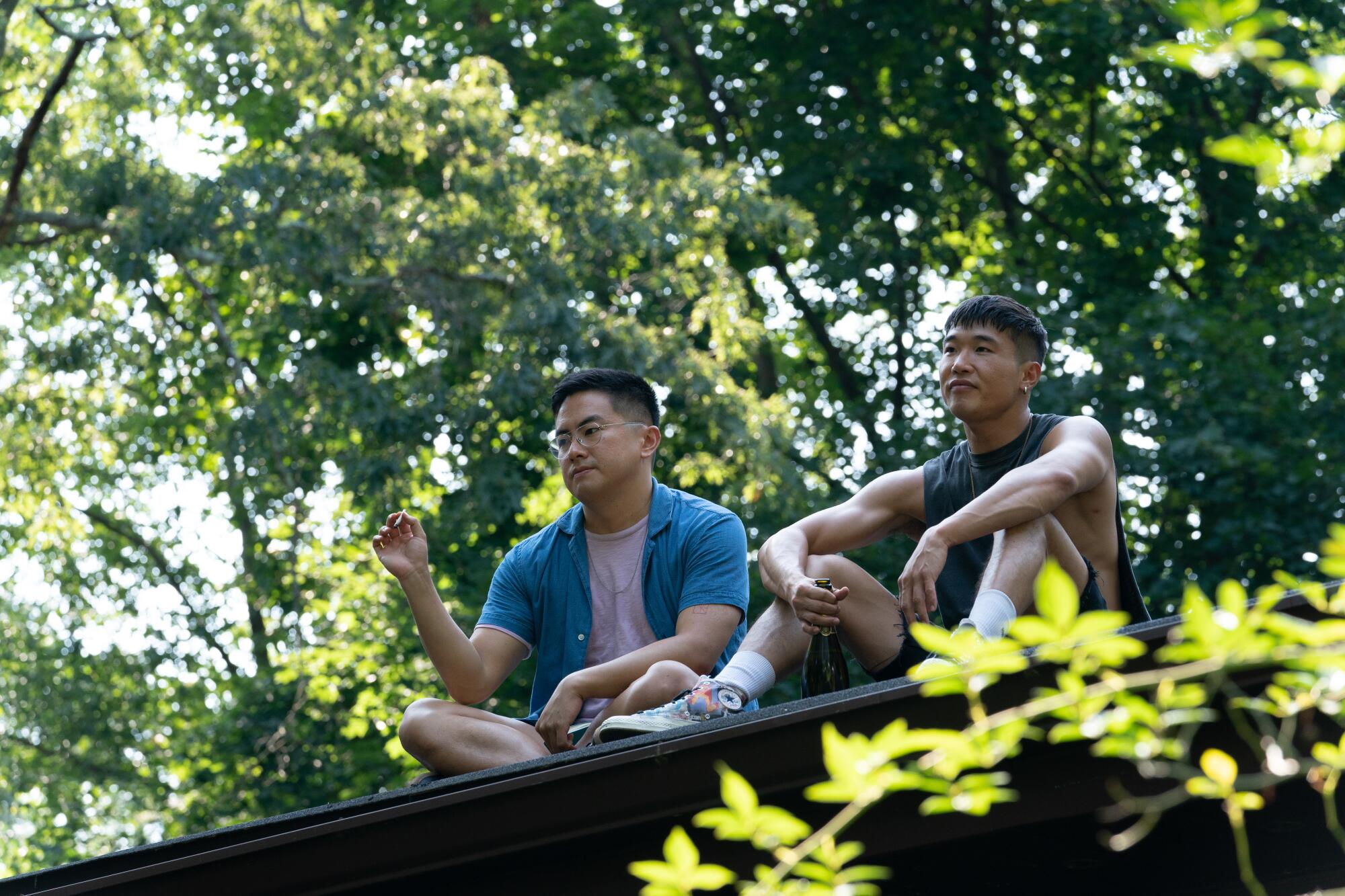
“Those layers are missing from the modern rom-com,” he said. “We love the hijinks and we love knowing that they’re going to get together, but how are they going to get together? I was interested in sitting in the quiet moments of these relationships and exploring the things that are keeping these people apart that aren’t necessarily plot devices, but existential ways of feeling about yourself within a community.”
Informed by his friendship with Yang and the oeuvre of Nora Ephron, Booster plays happily broke and single Noah, who vows to stay celibate on his Fire Island holiday until he can help hopeless romantic Howie (Yang, as the Jane to his Lizzie Bennet) hook up with the man of his dreams. But their lives are drifting apart too, placing more at stake than just summer loving. “I have had to convince Bowen not to leave vacations early,” said Booster. “I’m sure he’d hate me revealing that! Bowen’s called me out on my s— plenty of times too. It is just the way good friends operate.”
When Howie falls for Charlie (James Scully), the cute doctor comes as a package deal with the disdainful Cooper (Nick Adams) and aloof Will (Conrad Ricamora), who strikes an instant love-hate sizzle with Noah. Meanwhile, the Wickham-esque Dex (Zane Phillips) adds to the dramatic entanglements threatening to ruin what could be Howie and Noah’s last getaway with their closest friends.
For Ricamora, who played Oliver on “How to Get Away with Murder,” and starred in “Soft Power” and “Little Shop of Horrors” off-Broadway, the chance to portray what director Andrew Ahn describes as “our Asian Mr. Darcy” was an unexpected gift. Although written to be played by an actor of color, the character was not explicitly Asian until Ricamora walked in for a chemistry read and left Booster flustered.
Here’s how a Jane Austen classic got a landmark queer update in ‘Fire Island,’ from writer-star Joel Kim Booster.
When he first got the call, he assumed it was a mistake. “‘They can’t be sending this to another Asian American. They don’t allow this many of us to be in things,’” thought Ricamora, who had never been to Fire Island before the film. “Growing up, I was constantly watching people like me in TV and film being emasculated and being the butt of the joke. To get to be part of reversing that trend feels really great.”
Originally written on spec as a half an hour comedy series and filmed partly on location in the Fire Island Pines and Cherry Grove, known as America’s first gay and lesbian town, “Fire Island” boasts an all-queer ensemble and the kinds of romantic lead roles that Booster and Yang never imagined they’d get to play.
“People ask me: Did you ever expect to be on ‘SNL?’ And no, it never dawned on me,” said Yang, who not only flexes dramatic and romantic chops but performs an iconic karaoke rendition of Spears’ shy girl anthem “Sometimes.” “Joel really gave me a gift. It’s surreal. I never thought I would chemistry test with a love interest, these things that you just don’t consider and don’t expect for yourself.”
Both assumed that in Hollywood’s limited, tokenizing fashion they would never get to act in the same project together, let alone star. But in the lead up to finding a home for “Fire Island” (then called “Trip”), Booster starred in his own Comedy Central stand-up special, released his 2018 debut stand-up album, “Model Minority,” and honed his act around deeply personal observations on race, sex and identity. He found power as a storyteller in his experience as a gay man and Korean adoptee raised in a white conservative Christian family in the Midwest.
“For the first half of my life, I wasn’t allowed to talk about what I was feeling, what I was experiencing,” he said. “So as soon as I had the opportunity, as soon as anyone was willing to listen, I just exploded ... When I was starting out there was a real hunger for authenticity. And for me, finding that authenticity was just as freeing.”
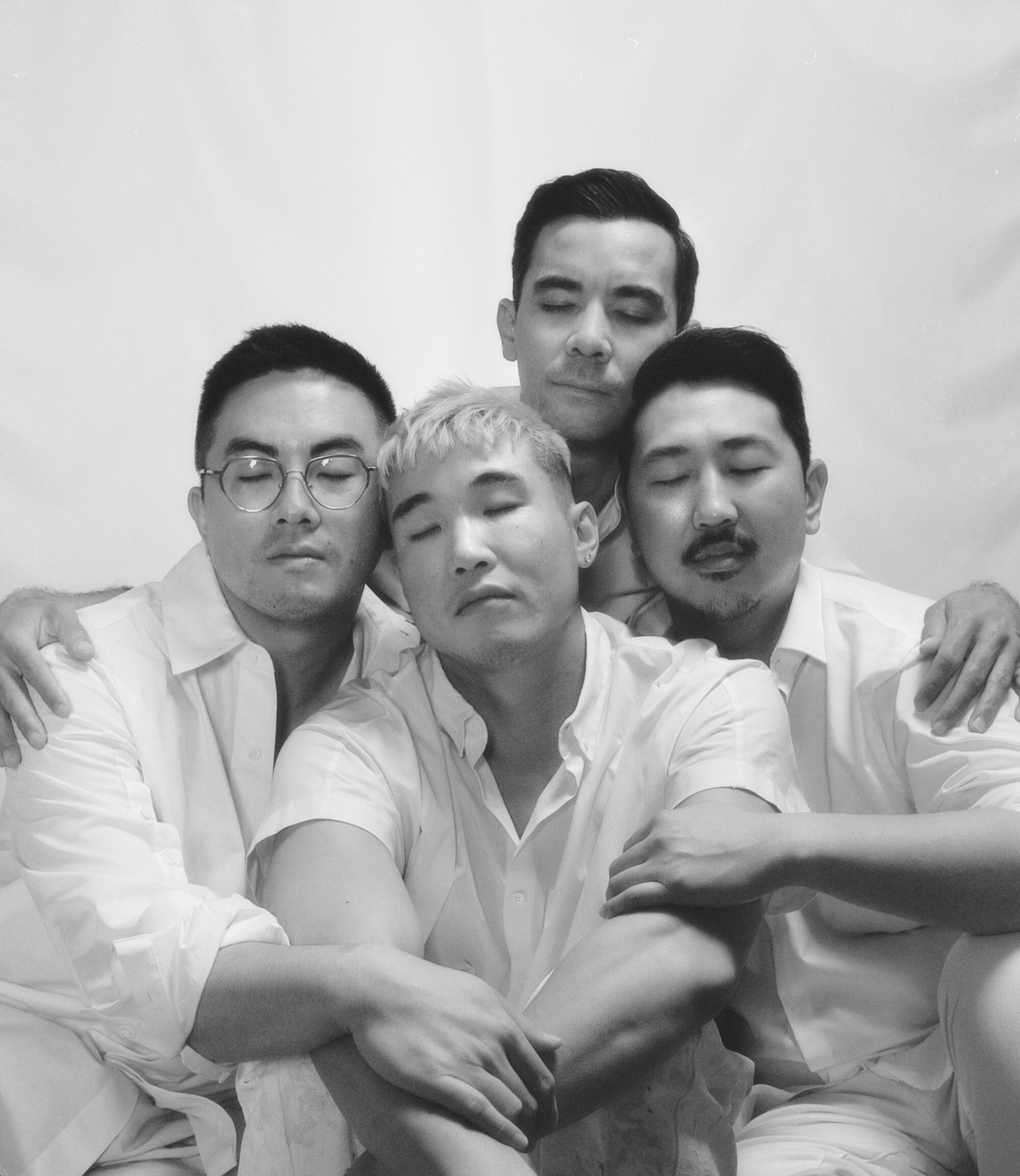
In the spring of 2020, Quibi gave Booster’s series a greenlight. By December, the upstart microplatform had shuttered. When Searchlight and Hulu revived the project as a feature film in 2021, Booster redeveloped it, knowing that he wanted to find a director to whom he wouldn’t have to explain what being gay and Asian felt like. “And that was Andrew,” said Booster, also an executive producer on the film.
Ahn had two acclaimed films under his belt with his 2016 debut, “Spa Night,” and 2019 drama “Driveways,” and he had interviewed for the project when it was at Quibi but didn’t get the gig. (“Jeffrey Katzenberg didn’t think I was funny enough!” he jokes.) By the time it came back around a year into the pandemic, a big part of his life had shifted when he moved out of the Echo Park house he shared with his closest friends.
“I was sheltering in place, super depressed, and I saw this story in a really different light,” said Ahn. “This was a film about queer Asian American friendship and joy.” Pitching producers and studio executives, he shared photos from the raucous themed parties that he and his housemates would throw. “We had a blacklight party we called ‘Asian Glow,’” said Ahn, laughing. “We have a lot of fun being silly and stupid, not having to worry about, like, representation. I went into the pitch with that attitude.”
This was a film about queer Asian American friendship and joy.
— ‘Fire Island’ director Andrew Ahn
That spirit went into casting Noah and Howie’s close-knit family of friends. “It was important to us to find people that meshed and gelled,” said Booster. They cast Rogers, who co-hosts the popular “Las Culturistas” podcast with Yang, as Luke, the impetuous Lydia of the group; Tomás Matos as effervescent Keegan, their Kitty; and Torian Miller as Max, the practical Mary of the bunch. “We lucked out so well. Tomás and Matt were a dream team. Torian is incredible and has such a huge task, being a little curmudgeonly but still funny. Everybody showed up.”
After a veteran male actor dropped out, prompting a gender swap, Margaret Cho stepped in to play worldly lesbian den mother Erin. “I can draw a straight line from ‘All-American Girl’ to this movie because I don’t know that I ever had a conception for what was possible for me in this industry before I saw her and that family on television,” Booster said of Cho’s groundbreaking 1994 sitcom. “I think every gay person on set took her aside and had a moment like, ‘I hope you know you’ve changed my life.’”
The actor, comedian and podcaster had offered her support of the film even before taking on the matriarchal role. Lounging poolside on days off, swapping clothes with her co-stars, “it was like being with a bunch of your sisters on vacation,” she said.
Moreover, the film’s Austenesque themes struck a chord. “When you’re gay, you feel like you can’t possibly be discriminatory towards anybody else because you’re oppressed, but in reality that’s not the case,” said Cho. “The most intense experiences of racism, classism, sexism and homophobia happen within the community, yet we don’t ever talk about it because that would negate the idea of pride.”
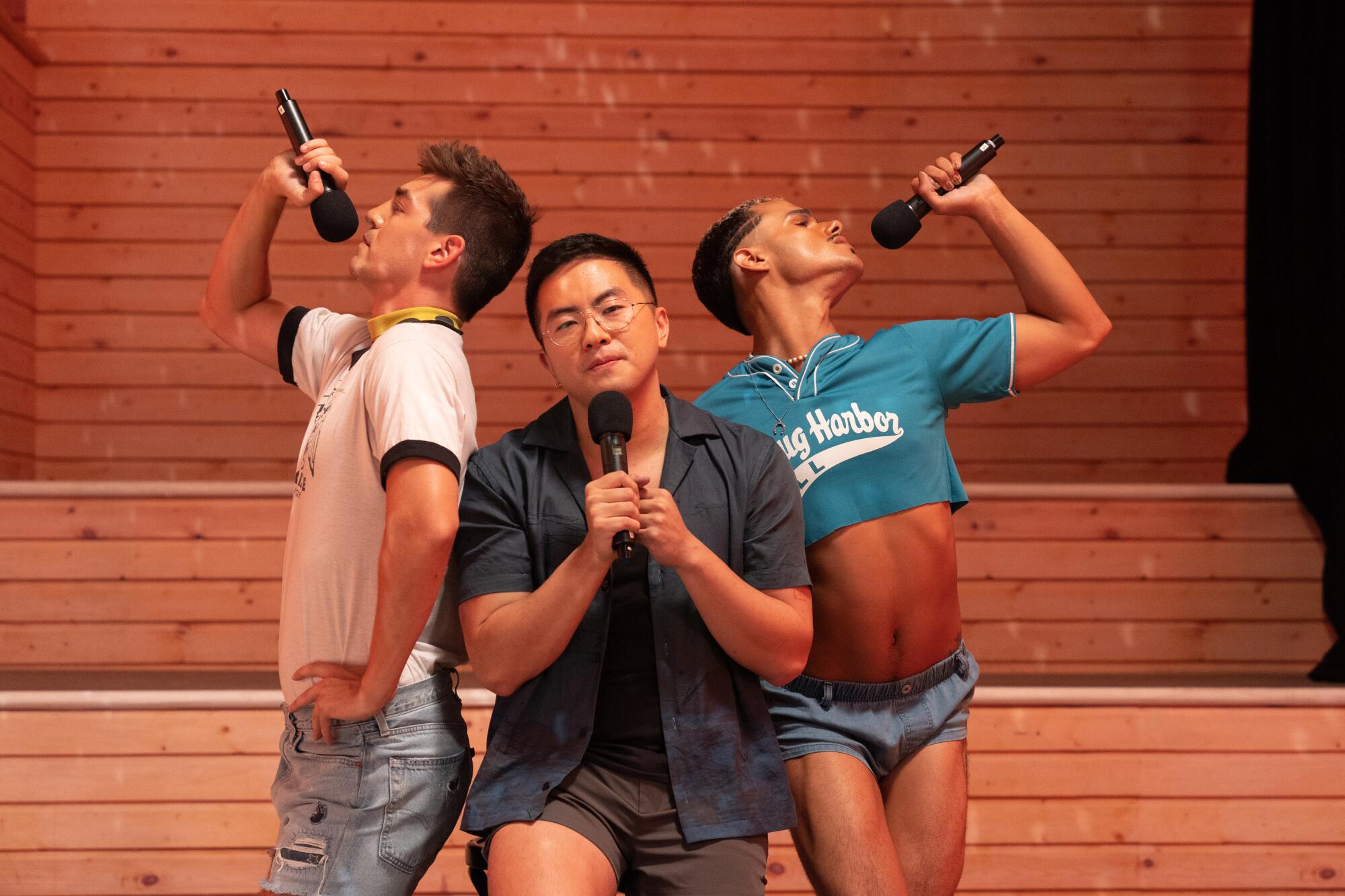
She especially related to the cautionary lessons Erin tries to give Noah about alienating the people he loves. “It was something that I totally understand because lesbians love to hold a grudge,” said Cho. “There are fights that I’ve had with women that have been going on since the ‘80s. But that’s how it is to be gay. You’re gay with the same gays all day, every day, forever, if you’re lucky enough to live that long.”
In the waning days of summer, production moved from New York City to shoot amid local landmarks as Ahn, cinematographer Felipe Vara de Rey and their cast and crew captured Fire Island’s textures and iconography, racing against time and tricky logistics. (One crucial rain scene even left Booster and Ricamora near-hypothermic.) But in the evenings, Ahn remembers, he could hear his actors cackling over “Real Housewives” through the vents in their shared bed-and-breakfast.
“The island brings people together,” he said. “I don’t think we would have that authenticity of friendship and intimacy if we weren’t on a tiny island, shooting during the day and going to the Canteen at night to get chicken fingers and drinks.”
Joel Kim Booster and especially Bowen Yang elevate a mixed attempt at turning a Jane Austen classic into a contemporary rom-com.
The big summer continues for Booster, who stars in the Maya Rudolph comedy series “Loot” for Apple and just released his new Netflix special, “Joel Kim Booster: Psychosexual.” Meanwhile, Rogers appears in Showtime’s “I Love That For You” opposite Vanessa Bayer, and Yang will be seen this fall in the Billy Eichner-led Universal rom-com “Bros.”
Before writing “Fire Island,” Booster had never been called in to audition for a romantic lead role. He’s still processing that audiences and the industry can now see him in that light. “I spent 34 years not considering myself a romantic leading man type because of my race or how effeminate I may or may not be, or my sexuality, or how attractive I am or aren’t. So it’s wild to be in this moment.”
And he’s already evolving creatively, examining his own identity-forward comedy and the unexpected burden of representation in “Psychosexual.” “Years ago in college, all I wanted to do was write for ‘The Wire,’” he said. “Hopefully I won’t have to write the next one, but we’ll see. I’m willing to do it if I have to.”
‘Lightyear’ features the first queer Pixar character shown kissing her wife on screen. The filmmakers explain how she was key to the the movie.
More to Read
Only good movies
Get the Indie Focus newsletter, Mark Olsen's weekly guide to the world of cinema.
You may occasionally receive promotional content from the Los Angeles Times.
